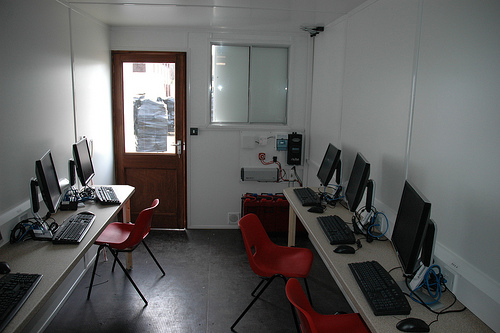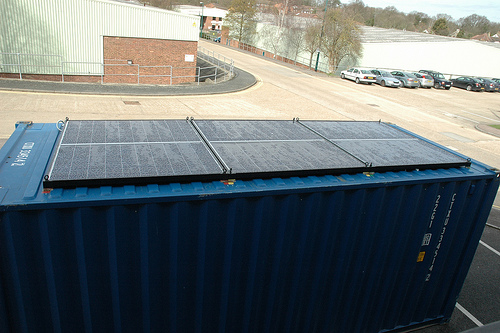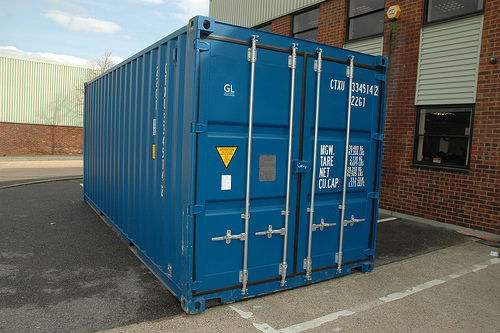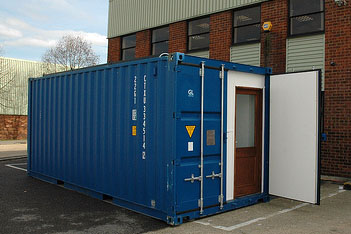Photos: The go-anywhere cyber cafe in a shipping container
Computer Aid has created its second cyber cafe in a shipping container, bringing internet connectivity where ever it's needed.


Computer Aid cyber cafe in a shipping container

Computer Aid cyber cafe in a shipping container

Computer Aid cyber cafe in a shipping container

Computer Aid cyber cafe in a shipping container
It's essentially the internet in a box - a shipping container with its own power source and wireless internet, ready to deploy anywhere in the world.
While internet access might seem universal to us in Europe, it's not for many in the world. Computer Aid is looking to change that with its new cyber cafes in a shipping container.
The group unveiled its second cafe in London this week, before the box was shipped to Kenya. The first is set to be installed in Zambia soon.
Computer Aid founder Tony Roberts said it was time for the hardware recycling group to move beyond its original remit.
The green IT charity has successfully hit its tenth birthday and shipped 100,000 old computers to be used by those in the developing world, leaving them thinking "it would be safe for us to look at meeting some of the other associated needs when you're providing computers to people in developing countries," Roberts told IT PRO.
Lab in a box
Once the decision was made to create a cyber cafe, the next question was how to go about it. As the shipping containers would be powered by solar panels, low-power PCs were necessary.
Get the ITPro daily newsletter
Sign up today and you will receive a free copy of our Future Focus 2025 report - the leading guidance on AI, cybersecurity and other IT challenges as per 700+ senior executives
"A normal solar array is only enough to power one normal PC with one monitor and one printer, so if you wanted to power a lab, you'd have to have 10 or 20 of those, and a related number of batteries, so it was quite expensive," explained Roberts.
Computer Aid decided to find a computing solution that required far less power than a standard one, so each container would need just one expensive solar panel. The group tested out netbooks as well thin client systems at African universities.
For netbooks, they looked at Intel's Classmate, Asus' Eee PC and One Laptop Per Child's XO.
They found the OLPC device required the least power, but none of testers liked it best overall, choosing the Eee PC as their preferred device.
Thin client
In the end, however, the universities decided a thin client system was the best solution to the problems at hand, opting for NComputing's low cost devices - which IT PRO readers will remember was also the system of choice for a girls' school in Afghanistan faced with similar cost and energy problems.

"We actually have a small network here in our offices running NComputing, which we run for four or five months before putting it in the first container to make sure it really did what it said in the box," he said.
Computer Aid's end design was for the solar computer lab was to use a regular, standard sea shipping container, topped with a solar panel to power a Pentium 4 PC, which NComputing devices split out for 10 seats.
The cafes are run on the ground by local charities. The first cafe is set to go live in Zambia soon. While the tiny town it will be sited in is 70 miles from the nearest major centre, it is home to a malarial research institute that has a satellite dish link with John Hopkins in the US, so the cafe will piggyback on that connection.
"The power of this idea is that we can drop that container anywhere in the world, literally in the middle of the Sahara desert," Roberts said, as the power all comes from the sun, and the connectivity is wireless - either satellite, Wi-Fi, WiMax or mobile broadband.
Of course, such a system doesn't come cheap. Each cafe costs 20,000 to put together, funded by trusts and foundations. But Roberts is planning to cut the cost of them by 5,000 and hoping the cyber cafes will draw the attention of local mobile operators.
"Whenever a mobile solution provider signs a contract with the government, it always signs a universal service provision contract which usually means one per cent of its profits go into a fund to connect the most rural people in that country," he said. "I'm hoping we'll be able to access funds from that source as well."
Click here or on gallery above for photos of the internet cafe, and read on for an interview with Tony Roberts of Computer Aid, where he explains why reuse is better than recycling.
Freelance journalist Nicole Kobie first started writing for ITPro in 2007, with bylines in New Scientist, Wired, PC Pro and many more.
Nicole the author of a book about the history of technology, The Long History of the Future.

